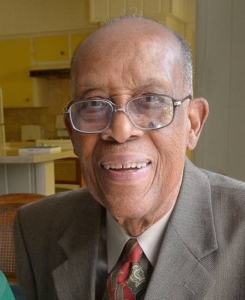Terrorized African-Americans Found Their Champion in Civil War Hero Robert Smalls
The formerly enslaved South Carolinian declared that whites had killed 53,000 African-Americans, but few took the explosive claim seriously—until now
Image: Harper’s Weekly reports on “The Steamer ‘Planter’ and Her Captor,” June 14, 1862 (Library of Congress Prints and photographs division)
(Smithsonian) In May 1862, an enslaved man named Robert Smalls won renown by stealing the Planter, the Confederate military transport on which he served as a pilot. On a night when the ship’s three white officers defied standing orders and left the vessel in the care of its crew, all slaves, Smalls guided it out of its slip in Charleston Harbor and picked up his wife, their two young children and other crewmen’s families at a rendezvous on the Cooper River. Flying the South Carolina state flag and the Stars and Bars, he steered past several armed Confederate checkpoints and out to the open sea, where he exchanged his two flags for a simple white one—a gesture of surrender to a Union ship on blockade duty. In all, he delivered 16 enslaved persons to freedom.
After serving the Union cause as a pilot for the rest of the Civil War, he returned to South Carolina, opened a general store that catered to the needs of freedmen, bought his deceased master’s mansion in Beaufort and edited the Beaufort Southern Standard. He soon dived into politics as a loyal Republican. In 1868, he was a delegate to the South Carolina convention charged with writing a new state constitution, which guaranteed freedmen the right to vote and their children the promise of free public education.
Over the next three decades, Smalls served South Carolina in both houses of its legislature and in the U.S. House of Representatives. In 1895, he was once again a delegate to the state constitutional convention—except this time, he was hoping to defend the freedmen’s right to vote against efforts by white South Carolina Democrats to quash it. Although Smalls had learned to read only in adulthood, he was a feared debater, and at age 56 the burly war hero remained an imposing figure. When he rose to speak at the State Capitol in Columbia, the chamber fell silent. (more)
SAAACAM works to remember, chronicle San Antonio’s black history
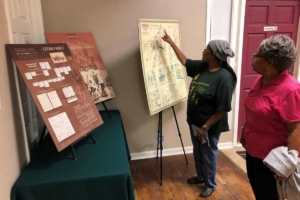
Susan Glosson and Charla Hutchens volunteer with the San Antonio African American Community Archive and Museum, which preserves African-American history.
(San Antonio Express-News) In 42 years of friendship, Charla Hutchens and Susan Glosson have shared many of the same experiences.
They both worked at Southeast Baptist Hospital. They both lived in the far East Side Lakeside subdivision. They both had relatives involved in the local Civil Rights movement. And both share a love of promoting and preserving African-American history.
It’s what drew the pair to volunteer with the San Antonio African American Community Archive and Museum, a nonprofit that collects, disseminates and interprets a digital database of authentic, community-based African-American history.
They are among more than 20 volunteers called the Friends of SAAACAM, an auxiliary committee of the nonprofit that gathers untold stories from families in and around San Antonio.
“Black history has been buried for so long,” said Glosson, 66. “That’s why I’m so excited to tell the story. Blacks have been in San Antonio history since the founding of San Antonio.” (more)
PVAMU alum
An activist, a veteran, a legacy — Fort Worth’s first black school trustee dies
(Fort Worth Star-Telegram) Reby Cary, Fort Worth’s first black school board trustee, and a World War II veteran, died (Dec. 7) at the age of 98. He leaves behind a legacy of political, cultural and educational achievements.
“He was an activist from the heart, and he was not afraid,” said Cary’s long-time friend and former Star-Telegram columnist Bob Ray Sanders, who now works at the Fort Worth Metropolitan Black Chamber of Commerce.
Cary was a man of many firsts. He was the first black man elected to the Fort Worth school board in 1974 and was elected to the state House of Representatives in 1979.
Cary went to I.M. Terrell High School before attending Prairie View A&M University. He joined the Coast Guard and fought through five campaigns in World War II and was a very proud military man, Sanders said. Sanders pointed out that Cary died on the 77th anniversary of Pearl Harbor. (more)
TIPHC Bookshelf
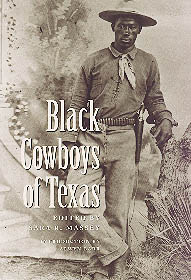 Published scholarship on black history in Texas is growing and we’d like to share with you some suggested readings, both current and past, from some of the preeminent history scholars in Texas and beyond. We invite you to take a look at our bookshelf page – including a featured selection – and check back as the list grows. A different selection will be featured each week. We welcome suggestions and reviews. This week, we offer, “Black Cowboys of Texas,” edited by Sara R. Massey.
Published scholarship on black history in Texas is growing and we’d like to share with you some suggested readings, both current and past, from some of the preeminent history scholars in Texas and beyond. We invite you to take a look at our bookshelf page – including a featured selection – and check back as the list grows. A different selection will be featured each week. We welcome suggestions and reviews. This week, we offer, “Black Cowboys of Texas,” edited by Sara R. Massey.
In the early days of Texas, the work of the cowhand was essential to the newly arrived settlers building a life on the frontier. The story of the Anglo cowboys who worked the ranches of Texas is well known, but much more remains to be discovered about the African American cowhands who worked side-by-side with the vaqueros and Anglo cowboys.
The cowboy learned his craft from the vaqueros of New Spain and Texas when it was the northern territory of Mexico, as well as from the stock raisers of the south. Such a life was hardly glamorous. Poorly fed, underpaid, overworked, deprived of sleep, and prone to boredom and loneliness, cowboys choked in the dust, were cold at night, and suffered broken bones in falls and spills from horses spooked by snakes or tripped by prairie dog holes. Work centered on the fall and spring roundups, when scattered cattle were collected and driven to a place for branding, sorting for market, castrating, and in later years, dipping in vats to prevent tick fever.
African American cowboys, however, also had to survive discrimination, bigotry, and prejudice. The lives of these cowhands tell a story of skill and grit, as they did what was necessary to gain the trust and respect of those who controlled their destiny. That meant being the best—at roping, bronc busting, taming mustangs, calling the brands, controlling the remuda, or topping off horses.
From scattered courthouse records, writings, and interviews with a few of the African American cowhands who were part of the history of Texas, Sara Massey and a host of writers have retrieved the stories of a more diverse cattle industry than has been previously recorded.
Twenty-five writers here recount tales of African Americans such as Peter Martin, who hauled freight and assisted insurgents in a rebellion against the Mexican government while building a herd of cattle that allowed him to own (through a proxy) rental houses in town. Bose Ikard, a friend of Charles Goodnight, went on Goodnight’s first cattle drive opening the Goodnight-Loving Trail. Johanna July, a Black Seminole woman, had her own method of taming horses in the Rio Grande for the soldiers at Fort Duncan.
These cowhands, along with others across the state, had an important role that too long has been omitted from most history books. By telling their stories, Black Cowboys of Texas provides an important contribution to Texas, Western, and African American history.
2000 T.R. Fehrenbach Book Award, presented by the Texas Historical Commission
This Week in Texas Black History
Dec 9
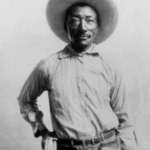 Taylor native Bill Pickett became the first African-American elected to the Rodeo Cowboy Hall of Fame on this day in 1971. Pickett is noted as the originator of “steer wresting” with his technique of “bulldogging” steers, during which Pickett would subdue unruly cows by jumping from his horse to the cow, wrestling him to the ground, then biting the creature’s lip. Pickett said he got the idea from watching dogs do the same thing when they were herding cows. Known as the “Dusky Demon,” Pickett has also been honored by the U.S. Postal Service as part of its “Legends of the West” series of commemorative stamps.
Taylor native Bill Pickett became the first African-American elected to the Rodeo Cowboy Hall of Fame on this day in 1971. Pickett is noted as the originator of “steer wresting” with his technique of “bulldogging” steers, during which Pickett would subdue unruly cows by jumping from his horse to the cow, wrestling him to the ground, then biting the creature’s lip. Pickett said he got the idea from watching dogs do the same thing when they were herding cows. Known as the “Dusky Demon,” Pickett has also been honored by the U.S. Postal Service as part of its “Legends of the West” series of commemorative stamps.
Dec 9
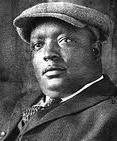 On this day in 1930, Calvert native Rube Foster, founder of baseball’s first successful all-black league, the Negro National League, died in Kankakee, Illinois. Known as the “Father of Black Baseball,” Foster was a star pitcher and manager for the Chicago American Giants, as well as league commissioner. The NNL, headquartered in Kansas City, Mo., had teams in the South and Midwest including Texas teams such as the Austin Black Senators, Fort Worth Black Panthers, and the Houston Eagles. Foster was elected to the Baseball Hall of Fame in 1981.
On this day in 1930, Calvert native Rube Foster, founder of baseball’s first successful all-black league, the Negro National League, died in Kankakee, Illinois. Known as the “Father of Black Baseball,” Foster was a star pitcher and manager for the Chicago American Giants, as well as league commissioner. The NNL, headquartered in Kansas City, Mo., had teams in the South and Midwest including Texas teams such as the Austin Black Senators, Fort Worth Black Panthers, and the Houston Eagles. Foster was elected to the Baseball Hall of Fame in 1981.
Dec 10
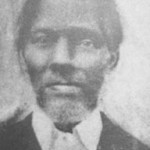 This day marks the passing of Rev. Jacob Fontaine in 1898. Born in Arkansas, Fontaine was a Baptist minister, publisher, and community leader who came to Austin in 1839 with his owner, Rev. Edward Fontaine, who served as personal secretary for Texas president Mirabeau B. Lamar. In 1867, Jacob Fontaine founded the First Baptist Church (Colored) on the same property where the Austin History Center now sits. In 1876, he established the Gold Dollar, one of the first black weekly newspapers in the South and the first newspaper under black ownership in Austin. He also participated in the founding of five African-American churches as well as the St. John Regular Missionary Baptist Association.
This day marks the passing of Rev. Jacob Fontaine in 1898. Born in Arkansas, Fontaine was a Baptist minister, publisher, and community leader who came to Austin in 1839 with his owner, Rev. Edward Fontaine, who served as personal secretary for Texas president Mirabeau B. Lamar. In 1867, Jacob Fontaine founded the First Baptist Church (Colored) on the same property where the Austin History Center now sits. In 1876, he established the Gold Dollar, one of the first black weekly newspapers in the South and the first newspaper under black ownership in Austin. He also participated in the founding of five African-American churches as well as the St. John Regular Missionary Baptist Association.
Dec 10
 On this day in 2011, Kevin Sumlin became the first black head football coach at Texas A&M University. In his first year as the Aggies’ head coach, Sumlin led A&M to a No. 5 national ranking and the program’s first 11-win season since 1998. Sumlin was a national coach of the year finalist and coached the first-ever freshman to win the Heisman Trophy – quarterback Johnny Manziel. Sumlin went to Texas A&M after leading the University of Houston Cougars to a school-record 13 victories and the program’s highest finish (No. 20) in the Bowl Championship Series standings in 2011. Sumlin posted a 35-17 overall record and led the Cougars to three bowl games fueled by his high-powered offense that led the nation in passing, total and scoring offense that set NCAA FBS team records for total offense and passing yards. When hired at UH in 2008, Sumlin became the first African-American head football coach at a NCAA Division I school in the state of Texas. Sumlin was born in Brewton, Alabama, however graduated high school in Indianapolis and attended Purdue University, graduating in 1988 with a bachelor’s degree in both criminology and criminal justice. He was a standout linebacker for the Boilermakers.
On this day in 2011, Kevin Sumlin became the first black head football coach at Texas A&M University. In his first year as the Aggies’ head coach, Sumlin led A&M to a No. 5 national ranking and the program’s first 11-win season since 1998. Sumlin was a national coach of the year finalist and coached the first-ever freshman to win the Heisman Trophy – quarterback Johnny Manziel. Sumlin went to Texas A&M after leading the University of Houston Cougars to a school-record 13 victories and the program’s highest finish (No. 20) in the Bowl Championship Series standings in 2011. Sumlin posted a 35-17 overall record and led the Cougars to three bowl games fueled by his high-powered offense that led the nation in passing, total and scoring offense that set NCAA FBS team records for total offense and passing yards. When hired at UH in 2008, Sumlin became the first African-American head football coach at a NCAA Division I school in the state of Texas. Sumlin was born in Brewton, Alabama, however graduated high school in Indianapolis and attended Purdue University, graduating in 1988 with a bachelor’s degree in both criminology and criminal justice. He was a standout linebacker for the Boilermakers.
Dec 11
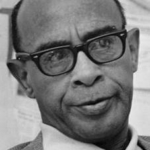 On this day in 1912, Heman Marion Sweatt was born in Houston. In 1946, Sweatt, a graduate of Wiley College, challenged the admissions policy at the University of Texas law school. He teamed with the NAACP, which was looking to test separate but equal education statutes in Texas. Sweatt’s legal battle struck down segregationist policies at the UT law school, gained him admission, and paved the way for the landmark decision of Brown v. Board of Education in 1954.
On this day in 1912, Heman Marion Sweatt was born in Houston. In 1946, Sweatt, a graduate of Wiley College, challenged the admissions policy at the University of Texas law school. He teamed with the NAACP, which was looking to test separate but equal education statutes in Texas. Sweatt’s legal battle struck down segregationist policies at the UT law school, gained him admission, and paved the way for the landmark decision of Brown v. Board of Education in 1954.
Dec 11
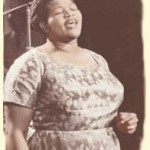 Texas blues pioneer Willie Mae “Big Mama” Thornton was born on this day in 1926 in Montgomery, Alabama. Thornton left home in 1941 to pursue her musical career, eventually settling in Houston in 1948. Her 1952 recording of “Hound Dog” was later a huge hit for Elvis Presley, and her song “Ball and Chain” was made famous by Janis Joplin.
Texas blues pioneer Willie Mae “Big Mama” Thornton was born on this day in 1926 in Montgomery, Alabama. Thornton left home in 1941 to pursue her musical career, eventually settling in Houston in 1948. Her 1952 recording of “Hound Dog” was later a huge hit for Elvis Presley, and her song “Ball and Chain” was made famous by Janis Joplin.
Dec 12
The Ashworth Act was passed by the Texas Congress on this day in 1840 in response to an act passed on February 5, 1840 which prohibited free blacks from living in the Republic of Texas. The Ashworth Act was targeted towards certain free blacks (primarily a family of blacks named Ashworth who had “contributed generously” during the Texas Revolution), but generally said that “all free persons of color together with their families, who were residing in Texas the day of the state’s Declaration of Independence” (March 2, 1836) could remain in the state. Other free blacks had two years to vacate Texas or be sold into slavery.
Dec 13
 On this day in 1967, actor and comedian Eric Marlon Bishop was born in Terrell. In 1989, Bishop changed his name to Jamie Foxx in an effort to get more performance time as a stand-up comic at a Los Angeles club. As an actor, he became the first African American to receive two acting Oscar nominations in the same year (2004) for two different movies, Collateral and Ray.
On this day in 1967, actor and comedian Eric Marlon Bishop was born in Terrell. In 1989, Bishop changed his name to Jamie Foxx in an effort to get more performance time as a stand-up comic at a Los Angeles club. As an actor, he became the first African American to receive two acting Oscar nominations in the same year (2004) for two different movies, Collateral and Ray.
Dec 14
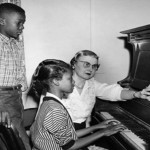 On this day in 1978, Iola Bowden Chambers, co-founder and director of the Negro Fine Arts School in Georgetown, died in Brownwood. Bowden was a native of Holder and received a diploma in piano in 1926 from the Washington Conservatory of Music. She returned to Texas and taught music at Southwestern Universitywhere she and three of her students began teaching piano to black children in Georgetown as the Negro Fine Arts School. The program was sponsored by the Student Christian Association at Southwestern University and classes were held at the First Methodist Church of Georgetown. Over 200 students participated in the school during its existence from 1946 to 1966. The program held an annual recital but also awarded college scholarships. One former teacher said the basic impact of the organization was “the realization of the power of music as a universal language to transcend racial and cultural barriers.”
On this day in 1978, Iola Bowden Chambers, co-founder and director of the Negro Fine Arts School in Georgetown, died in Brownwood. Bowden was a native of Holder and received a diploma in piano in 1926 from the Washington Conservatory of Music. She returned to Texas and taught music at Southwestern Universitywhere she and three of her students began teaching piano to black children in Georgetown as the Negro Fine Arts School. The program was sponsored by the Student Christian Association at Southwestern University and classes were held at the First Methodist Church of Georgetown. Over 200 students participated in the school during its existence from 1946 to 1966. The program held an annual recital but also awarded college scholarships. One former teacher said the basic impact of the organization was “the realization of the power of music as a universal language to transcend racial and cultural barriers.”
Dec 15
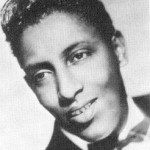 Jesse Belvin, R&B singer and songwriter, was born on this day in San Antonio (some accounts say Texarkana, Texas). At the age of five, Belvin moved with his family to Los Angeles. Known by some as the “Black Elvis,” Belvin’s most popular hit was “Good Night My Love,” which reached No. 7 on the R&B charts in 1956. He also wrote the song “Earth Angel” which was a hit for the Penguins and sold over a million copies in 1954.
Jesse Belvin, R&B singer and songwriter, was born on this day in San Antonio (some accounts say Texarkana, Texas). At the age of five, Belvin moved with his family to Los Angeles. Known by some as the “Black Elvis,” Belvin’s most popular hit was “Good Night My Love,” which reached No. 7 on the R&B charts in 1956. He also wrote the song “Earth Angel” which was a hit for the Penguins and sold over a million copies in 1954.
Blog: Ron Goodwin, Ph.D., author, PVAMU history professor
Ron Goodwin is an assistant professor of history at Prairie View A&M University. Even though he was a military “brat,” he still considers San Antonio home. Like his father and brother, Ron joined the U.S. Air Force and while enlisted received his undergraduate degree from Texas Lutheran University in Seguin, Texas. After his honorable discharge, he completed graduate degrees from Texas Southern University. Goodwin’s book, Blacks in Houston, is a pictorial history of Houston’s black community. His most recent book, Remembering the Days of Sorrow, examines the institution of slavery in Texas from the perspective of the New Deal’s Slave Narratives.
Recent Posts
Uncommon integrity
I, (NAME), do solemnly swear (or affirm) that I will support and defend the Constitution of the United States against all enemies, foreign and domestic; that I will bear true faith and allegiance to the same; and that I will obey the orders of the President of the United States and the orders of the…(more)
Democratic hypocrisy
Democracy (noun) – The belief in freedom and equality between people, or a system of government based on this belief, in which power is either held by elected representatives or directly by the people themselves. — Cambridge Dictionary Over a hundred years ago W.E.B. Dubois asked if one could be black and an American. He saw this “twoness” as perhaps the central issue affecting all Africans in America. Personally, I also feel a unique identity crisis…(more)
Submissions wanted
Historians, scholars, students, lend us your…writings. Help us produce the most comprehensive documentation ever undertaken for the African American experience in Texas. We encourage you to contribute items about people, places, events, issues, politics/legislation, sports, entertainment, religion, etc., as general entries or essays. Our documentation is wide-ranging and diverse, and you may research and write about the subject of your interest or, to start, please consult our list of suggested biographical entries and see submission guidelines. However, all topics must be approved by TIPHC editors before beginning your research/writing.
We welcome your questions or comments. Please contact Michael Hurd, Director of TIPHC, at mdhurd@pvamu.edu.

